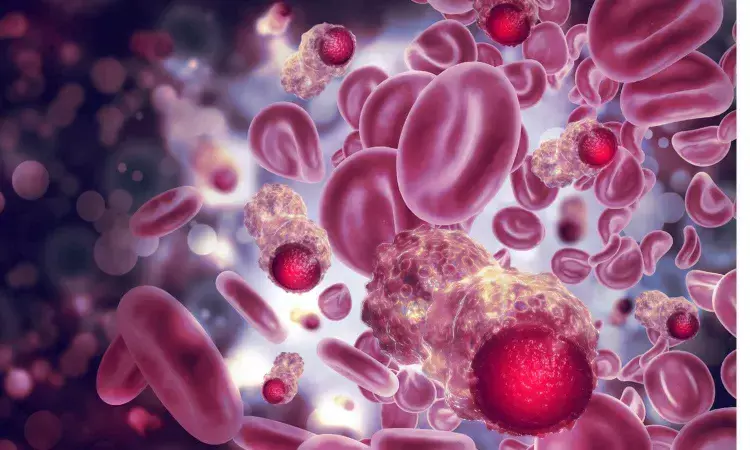- Home
- Medical news & Guidelines
- Anesthesiology
- Cardiology and CTVS
- Critical Care
- Dentistry
- Dermatology
- Diabetes and Endocrinology
- ENT
- Gastroenterology
- Medicine
- Nephrology
- Neurology
- Obstretics-Gynaecology
- Oncology
- Ophthalmology
- Orthopaedics
- Pediatrics-Neonatology
- Psychiatry
- Pulmonology
- Radiology
- Surgery
- Urology
- Laboratory Medicine
- Diet
- Nursing
- Paramedical
- Physiotherapy
- Health news
- Fact Check
- Bone Health Fact Check
- Brain Health Fact Check
- Cancer Related Fact Check
- Child Care Fact Check
- Dental and oral health fact check
- Diabetes and metabolic health fact check
- Diet and Nutrition Fact Check
- Eye and ENT Care Fact Check
- Fitness fact check
- Gut health fact check
- Heart health fact check
- Kidney health fact check
- Medical education fact check
- Men's health fact check
- Respiratory fact check
- Skin and hair care fact check
- Vaccine and Immunization fact check
- Women's health fact check
- AYUSH
- State News
- Andaman and Nicobar Islands
- Andhra Pradesh
- Arunachal Pradesh
- Assam
- Bihar
- Chandigarh
- Chattisgarh
- Dadra and Nagar Haveli
- Daman and Diu
- Delhi
- Goa
- Gujarat
- Haryana
- Himachal Pradesh
- Jammu & Kashmir
- Jharkhand
- Karnataka
- Kerala
- Ladakh
- Lakshadweep
- Madhya Pradesh
- Maharashtra
- Manipur
- Meghalaya
- Mizoram
- Nagaland
- Odisha
- Puducherry
- Punjab
- Rajasthan
- Sikkim
- Tamil Nadu
- Telangana
- Tripura
- Uttar Pradesh
- Uttrakhand
- West Bengal
- Medical Education
- Industry
A new cell therapy for leukaemia shows high efficacy and safety in the laboratory: Study

T-cell Acute Lymphoblastic Leukaemia (T-ALL) is a highly aggressive form of blood cancer that can occur in both children and adults. It is characterised by failures in the maturation of T-lymphocytes, key immune cells involved in the defence against infections and cancer, which, instead of performing their function, proliferate uncontrollably in the bone marrow. While the cure rate in children exceeds 80%, in adults it remains at around 40% and is associated with a high probability of relapse following chemotherapy.
However, advances in the field of immunotherapy, especially CAR-T cell treatments that show remarkable results in other blood cancers, have not yet reached T-ALL. This is precisely because the cells affected are the same cells used in these therapies, T-lymphocytes. Identifying markers that are in tumour lymphocytes and not in healthy T-lymphocytes, thus avoiding fratricidal attack, is particularly complicated.
Finding a way to distinguish leukaemic T-cells from healthy ones is just what Dr Pablo Menéndez's team at the Josep Carreras Leukaemia Research Institute has now achieved, with the support of Dr Diego Sánchez, ARAID researcher at the Aragon Health Research Institute, and the biotech company OneChain Immunotherapeutics, a spin-off of the Josep Carreras Institute. Their research has demonstrated that the proteins CD1a and CCR9 are present in the leukaemic cells of most T-ALL patients, but are not appreciably expressed in healthy cells or other parts of the body.
Thanks to this discovery, published in the Journal of Hematology & Oncology, one of the leading journals in the field, the scientific team has been able to develop and test in the laboratory the first dual CAR-T cell therapy targeting T-ALL. Experimental results show that these new CAR-T cells attack cells that express both CD1a and CCR9, as well as those expressing only one of the two, and that they can effectively control the disease in both in vitro and in vivo models.
The ability to target two antigens simultaneously makes this therapy significantly more effective than those focusing on only one, as demonstrated in the study. It also broadens its applicability to patients with heterogeneous T-ALL, in which the expression levels of the two targets vary among leukaemic cells.
Moreover, unlike previous attempts, these new dual CAR-T cells targeting CD1a and CCR9 spare both healthy T lymphocytes and themselves, as well as other bone marrow cells, resulting in an excellent safety profile. These findings, combined with previous evidence from the same research team and others internationally, open the door to the clinical development of what could become the first effective cell therapy against T-ALL in the medium term.
Reference:
Tirado, N., Fidyt, K., Mansilla, M.J. et al. CAR-T cells targeting CCR9 and CD1a for the treatment of T cell acute lymphoblastic leukemia. J Hematol Oncol 18, 69 (2025). https://doi.org/10.1186/s13045-025-01715-0.
Dr Kamal Kant Kohli-MBBS, DTCD- a chest specialist with more than 30 years of practice and a flair for writing clinical articles, Dr Kamal Kant Kohli joined Medical Dialogues as a Chief Editor of Medical News. Besides writing articles, as an editor, he proofreads and verifies all the medical content published on Medical Dialogues including those coming from journals, studies,medical conferences,guidelines etc. Email: drkohli@medicaldialogues.in. Contact no. 011-43720751


